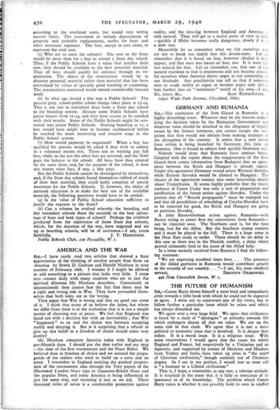GERMANY AND RUMANIA
SIR,—The restitution of the Iron Guard in Rumania is a highly disturbing event. Whatever may be the reasons under- lying the decision taken by the Rumanian Government and whatever value should be attached to the allegiance of loyalty sworn by the former terrorists, one cannot escape the sus- picion that they would not abstain from making attempts at the disruption of the country. It seems that a new attack from within is being launched by Germany, this time on Rumania. One is bound to admire how quickly Germany acts.
Nobody would deny that Rumania faces anxious hours. Coupled with the report about the reappearance of the Iron Guard there comes information from Budapest that an agree- ment between the Reich and Hungary is already signed. Under this agreement Germany would annex Western Slovakia while Eastern Slovakia would be allotted to Hungary. The clauses of the agreement contain also some interesting details about Transylvania. It seems highly probable that the recent outburst of Count Csaky was only a sort of preparation and justification of the future action against Slovakia. Under the pretext that all "Benesh propaganda " must be stamped out and that all possibilities of rebuilding of Czecho-Slovakia have to be removed for good, the Reich and Hungary are going to partition Slovakia.
A joint Russo-German action against Rumania—with Russia trying to extort first the concessions from Rumania— can be expected soon. The Northern card is, for the time being, lost for the Allies. But the Southern trump remains and it must be played to the full. There is a large army in the Near East ready to strike. There should be no delay in this case as there was in the Finnish conflict, a delay which proved ultimately fatal to the cause of the Allied help.
In a letter recently received from Bucarest I find the follow- ing sentence: "We are expecting troubled times here. . . . The presence of the Allied garrisons in Rumania would contribute greatly to the security of our country.. . ."—I am, Sir, your obedient


































 Previous page
Previous page